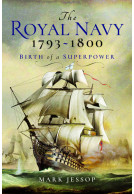The Royal Navy in the Napoleonic Age (Hardback)
Senior Service, 1800–1815
Imprint: Pen & Sword History
Pages: 192
Illustrations: 32
ISBN: 9781526720375
Published: 4th November 2019
(click here for international delivery rates)
Need a currency converter? Check XE.com for live rates
| Other formats available - Buy the Hardback and get the eBook for free! | Price |
|---|---|
| The Royal Navy in the Napoleonic… ePub (17.2 MB) Add to Basket | £6.99 |
In 1801 the newly forged United Kingdom of Great Britain and Ireland commenced life at war with France and her allies and remained so until 1815. After 1812 she had to shoulder the extra burden of a war against the United States of America. With conflict on multiple fronts, hardships continued to be inflicted at home. Trade was made precarious. People became bone-weary of hostilities and the threat of invasion ran high.
Napoléon Bonaparte was no ordinary opponent, and the United States navy showed the world the worth of her ships, but what stood in their way was the Royal Navy. Despite notable losses, after the victory of Trafalgar in 1805 she dominated the seas. Although not the only means, her warships were the nation’s first line of defence that helped keep British shores safe.
As the era ended it was obvious the navy had to change. Steam began to alter perspectives with new opportunities. From the vantage point of later decades it could be seen what the Royal Navy had once been and still was. A naval superpower. Britain’s oldest continual military force. The senior service.
This is truly one of the most enjoyable history books I ever remember reading! The way the gems of wisdom contained in each chapter are presented is refreshing. If you want to learn more about the naval side of the Napoleonic Wars, Great Britain’s Senior Service, or are just looking for an informative read, you will be hard-pressed to make a better selection.
Pirates and Privateers
Read the full review here
Featured in
The Napoleonic Historical Society Newsletter, June - July 2021
I found this book a most enjoyable read. It is far removed from the usual story about the Royal Navy during a particular time. Yes it does cover the first fifteen years of the 1800s and yes it does relate to recorded events and characters but the author takes the reader back to the time and place setting the scene by allowing us to listen into conversations being held by local residents and sailors. Their worries and concerns especially with regard to a possible invasion by the French. The book also tells of the development of what we now know as Devonport and how the fortunes of the Royal Navy waxed and waned much like modern times. The research carried out by the author was extensive. Some 140 plus Bibliography searches plus more than seventy journals, articles and reports investigated.
Navy Daze, The Ton Class Association
I will be returning to the story again. Highly recommended.
Mark Lardas, League City, Texas
Nautical Research Journal 66:1 (March 2021)
The Royal Navy in the Napoleonic Age serves as a good introduction to the period for readers unfamiliar with the period. Jessop covers the key aspects of naval history during the period, introducing technical aspects in in a manner accessible to those unfamiliar with them. For those bored by academic histories, this book will be engaging.
The use of the fictional scenarios, mixed with the factual details of the times I found not only a nicely done style that made it interesting reading, but I learnt a lot in the detail that is woven into everything. Near the end it talks about the early use of steam power, so wind and tides would not be such an influence on navigation for warships. Wooden warships, large and small, were key to defending Great Britain, and protecting her maritime trade. Equally, in times of peace, the need to reduce the size of the navy and save money was as difficult then as it has been in more recent years. I enjoyed reading this one.
Military Model Scene, Robin Buckland
Read the full review here
As featured by
The Naval Review
Though only having nine chapters, we were really impressed with the eye for detail and the ability to dig out details that bring the events of the time to life.
The Trafalgar Times, January 2020
This book is well researched and sourced, having 24 pages of index and 13 pages of references. There are also sixteen pages of illustrations and maps, some of which we were not too familiar with.
Overall, we feel this is a great addition to our library and we now have the urge to delve into the back catalogue to get a copy of Jessop’s previous book covering 1793- 1800.
The author starts each chapter with a short fictional scene that graphically sets the stage for the thoroughly researched historic detail. The story is told from the point of view of British seamen and civilians. – Highly Recommended.
Firetrench
Read the full review here
As the nineteenth century began the newly-forged United Kingdom of Great Britain and Ireland commenced life at war with France and her allies and remained so until 1815. After 1812 she had to shoulder the extra burden of a war against the United States of America. With conflict on multiple fronts, hardships continued to be inflicted at home. Trade was precarious. People were weary of hostilities and the threat of invasion still ran high. But the Royal Navy was Britain’s sure shield and after the victory of Trafalgar in 1805 she dominated the seas. Her warships spread out all over the world were the nation’s first line of defence. The Royal Navy is Britain’s oldest continual military force and rightly deserves the respect that is accorded as The Senior Service.
Julian Stockwin Blog
Read the full review here
It takes us into areas that aren’t always covered, and makes it stand out from the crowd of Napoleonic Naval studies. The focus on Plymouth demonstrates the impact the wars could have back in Britain, especially in the major ports, while the chose of characters means we spend most of our time either on the lower decks, or getting the civilian view of the wars.
History of War
Read the full review here
We warmly recommend this book to ‘beginner’ and ‘old-hand’ alike. The beginner because it makes the information so accessible and real. The old-hand because it enriches the wealth of information with a flavour of the times.
Clash of Steel
Read the full review here
An entertaining and absorbing read.
Navy News
The coverage of this excellent book is just fifteen years, during which the Royal Navy did indeed rule the waves. Mark Jessop looks at the reasons why Britain was so dominant in terms of naval military might, and looks at how the various conflicts led to a realisation that the Navy had to change.
Books Monthly
Jessop’s thought-provoking study of how unremitting warfare affected people and society and spurred the development of new technologies and practices at sea is a homage to the pioneering works of Jeremy Black, Linda Colley, and Edward Thompson and a worthy continuance of Power’s idea of sparking the interest of the reading public through fiction. Anyone considering how to differentiate their exhibition or a publication from those of others will do well to look at this work, while the general reader will find it difficult to put the book down. Anyone who is seeking a Christmas present could do well to start here.
Australian Naval Institute
Read the full review here
"The author has given an interesting introduction to this subject which should be read in conjunction with Marcus before moving on to Lavery."
Friends of the Waterloo Committee
A fascinating subject, well served by an erudite and imaginative author. Great stuff!
A Question Of Scale, Seb Palmer
Read the full review here
Featured 'ON THE BOOK SHELF' by Neil Smith
Wargames Illustrated, October 2019
This book is quite an interesting take on the subject in that the author delivers information through fictitious dialogues and individuals in order to place the story in context. It generally works, and coupled with more traditional historical narratives delivers an entertaining book. By using this method, the author avoids a strict chronological approach but rather follows each aspect of his subject across the whole period of 15 years. It is an interesting approach to delivering history which one might think would be vexatious but it is not. It is a good read if only as a counterpoint to the more traditional histories and for that reason I liked it.
Michael McCarthy
Michael McCarthy. Battlefield Guide
















